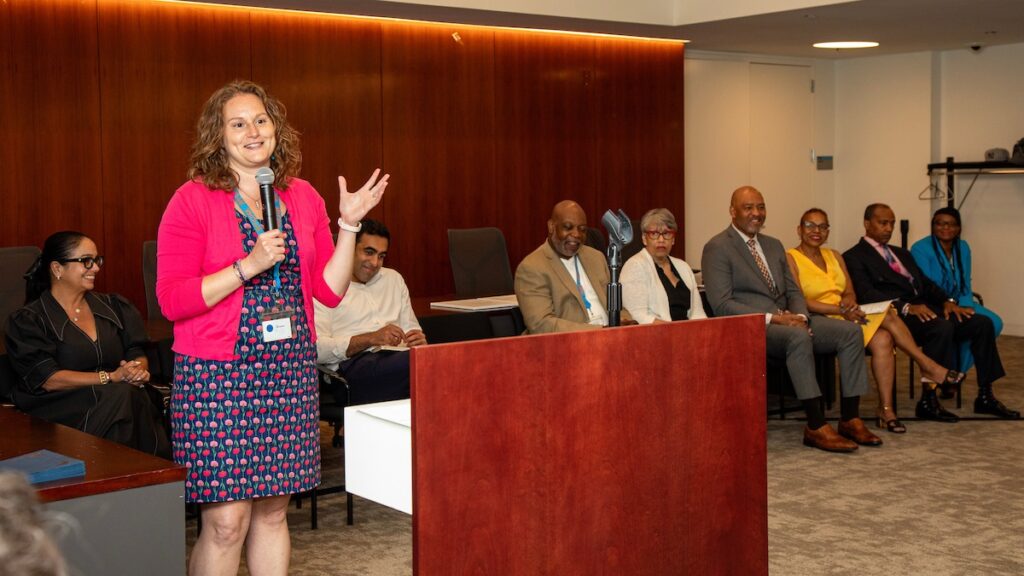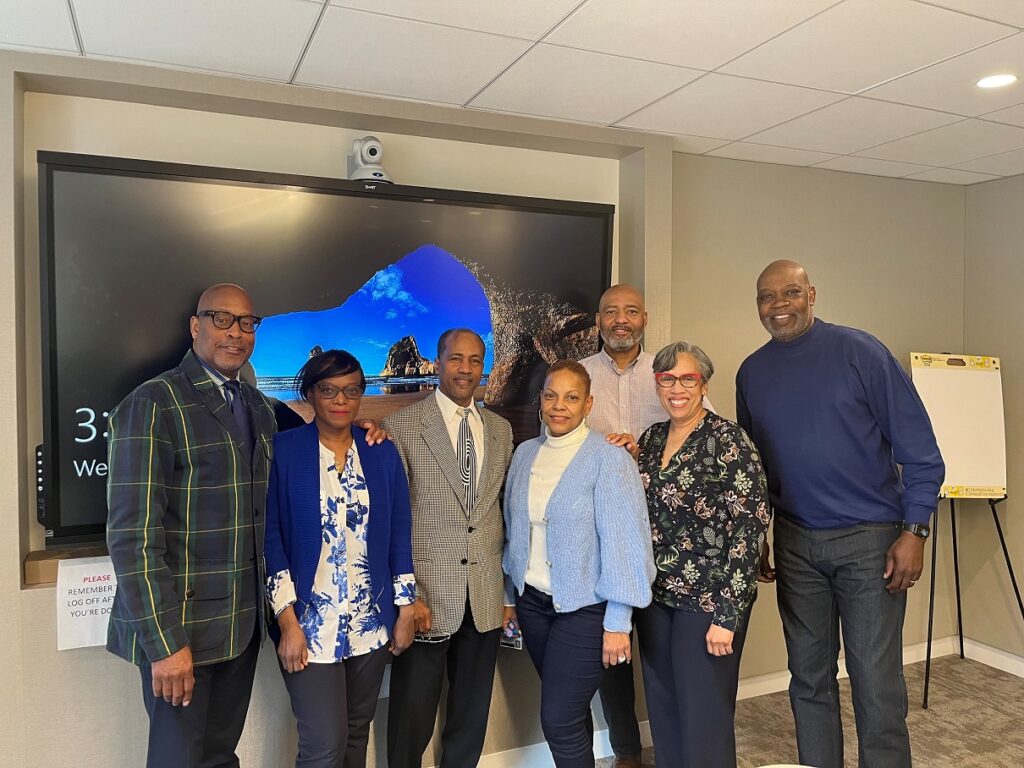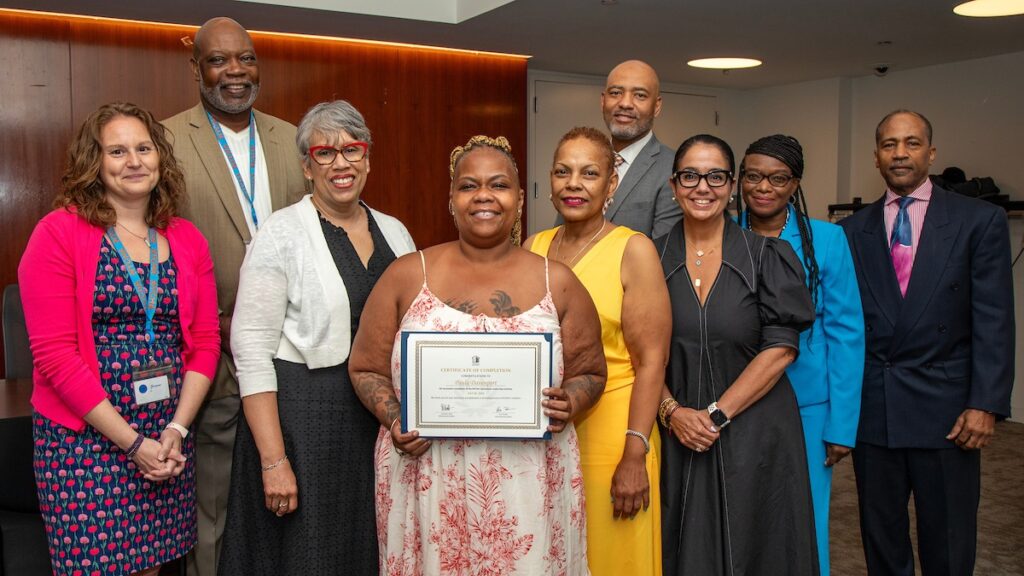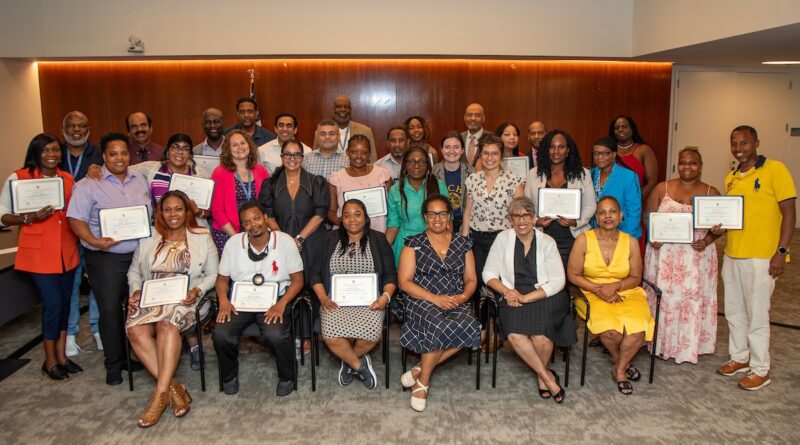New Leadership Training Program Graduates First Class of Administrators
NYCHA recently celebrated the first graduates of a new training initiative that seeks to empower agency leaders as part of citywide efforts to enhance services for residents.
Thirty employees serving as neighborhood administrators across the five boroughs completed the 12-week program, the Operations Leadership Institute (OLI), with a ceremony on July 26. A project administered by the Office of Strategy & Innovation, in partnership with the Office of the Chief Operating Officer, the initiative was developed to provide high-level professional development training to NYCHA’s senior and rising operations staff.
“We recognize the importance of supporting our managers in dealing with the complex issues they are presented with every day – repairs, resident complaints, staffing issues,” Chief Operating Officer Eva Trimble said. “We know there is no typical day at NYCHA, and our managers and supervisors need tools to be able to juggle multiple competing priorities.”
Neighborhood administrators were the first OLI participants to receive coaching from several former longtime NYCHA employees who serve as course instructors, sharing knowledge and best practices on how to advance the skillsets of development staff and help mentor the next generation of leaders.

According to the Strategy and Operations team, this is the first professional development training of its kind offered to neighborhood administrators, as NYCHA is aiming to promote a culture of continuous learning for those in current and future leadership roles.
“We want to make sure they’re being supported toward that advancement,” noted Andrea Asprelli, Director of Strategic Operations. “Training is a big focus in general for NYCHA right now; across the board, we want to have a continuous learning culture where staff can share knowledge with each other, where we’re sharing information across boroughs, and where staff can continue to receive training as they are promoted into supervisory roles.”
Through classes held at the central office at 90 Church Street and development site visits, the OLI program features six two-week sessions on various NYCHA leadership and management topics regarding operational functions, such as “developing your team;” managing work orders and repairs; rent collections and recertifications; and buildings, grounds, and apartment inspections. Following the training for all neighborhood administrators that concluded in late July, the OLI will continue with sessions for select property managers and superintendents across NYCHA, beginning in August and October, respectively.
A key component of the OLI initiative is the instruction from former veteran employees who have held similar administrative jobs at the Authority and can share firsthand experience on the conditions and challenges that many of the participants face. In some cases, the instructors have also previously worked with the trainees.

The OLI instructor team includes Derek Powell, Kevin Norman, Stephanie Davis, Develle Cave, Michael Baker, Clarence Gordon, and Lisa Clavery. Some outside vendors skilled in conflict resolution and self care are also contributing to the coaching modules, including Yuko Uchikawa from OpenTalk and a training team from the Office of Administrative Trials and Hearings.
“NYCHA staff know NYCHA best,” Neagia Drew, Deputy Director in the Office of Quality Assurance, said of the instructors being retirees. “They’ve sat in those shoes, they supervised at NYCHA developments, they know the neighborhoods and what some of the challenges are, so they can use their experience in the trainings.”
Ms. Asprelli added, “We know that they have the knowledge that they’ve built over decades of how NYCHA works and runs; they’ve held the positions that they’re training for and that really adds a lot of value to the experience of the participants.”
Ms. Clavery, a retiree serving as the OLI curriculum developer, also pointed to the advantages for trainees to learn from seasoned NYCHA supervisors.
“We’re having people come back who not only understand NYCHA’s history but they understand where trainees are currently, and they’ve done the work,” noted Ms. Clavery, who worked at NYCHA for 31 years, most recently as a senior management trainer, before retiring in December 2021. “I think that transfer of knowledge is very important to the success of the agency in order for it to move forward.”
In addition to their institutional expertise, the retiree instructors are “familiar faces” whom some class participants have learned from in the past, said Manhattan Neighborhood Administrator Paula Davenport.
“We know these people’s personalities and know that they’re trustworthy; they’re people who actually were your leaders at one point in your career,” said Ms. Davenport, a former Queensbridge South Houses resident and NYCHA employee since 1998. “They were actually there to help us, guide us, and lead us, and that’s what they did. The information is outstanding; they break it down so that you understand it.”

Ms. Davenport said the program “turned a light on” for how to better lead her team, and she has already begun to apply some of the acquired skills and concepts to her job. This includes encouraging employees to take on more leadership roles themselves and improving communication between staff and resident association leaders.
“This leadership program makes you think outside of the box for what you can do to better serve everybody,” said Ms. Davenport, noting that neighborhood administrators from different parts of the city were able to bond through the environment of peer learning. “It’s really excellent, and I think that everyone can benefit from it.”
While serving at NYCHA, Ms. Clavery said she was in favor of implementing a leadership initiative for staff transitioning to senior roles, saying that the positions require the ability to navigate a variety of issues and facets of the organization.
“There are so many things that come into play,” she said of NYCHA management jobs. “The overall goal of OLI is to make sure people have the information that they need so that they can be successful in this new position.”
The program aims to help neighborhood administrators become “well versed” in both maintenance-related processes and management responsibilities. The training sessions are uniformly structured for each of the trainee groups of neighborhood administrators, property managers, and superintendents to help ensure that everyone receives the same content to apply to their roles, Ms. Clavery explained.
“We’re giving the information so that people can have these discussions and that the policies and procedures are followed consistently across the agency,” she said.
For Neighborhood Administrator Ms. Davenport, she is pleased to be among the agency leaders who are now provided with comprehensive training to help them grow their careers and those of their staff.
“This was the first program where every time I left, I went and used what I learned at my developments; it’s changed my mindframe, changed how I conduct myself as a leader, and it’s changed how I build my team,” Ms. Davenport concluded.







